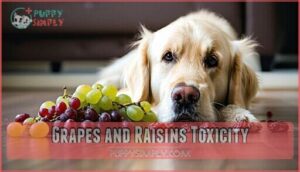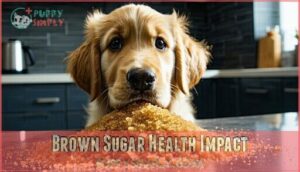This site is supported by our readers. We may earn a commission, at no cost to you, if you purchase through links.
 You shouldn’t let your dog eat brown sugar.
You shouldn’t let your dog eat brown sugar.
While it’s not toxic like chocolate, brown sugar can cause serious health problems for your furry friend.
It leads to weight gain, tooth decay, upset stomach, and dangerous blood sugar spikes.
Dogs don’t need added sugars in their diet, and even small amounts can contribute to obesity and diabetes over time.
Their digestive systems aren’t designed to handle processed sugars like ours.
Instead of sugary treats, stick to dog-safe alternatives like small pieces of apple or carrot.
Understanding which everyday foods pose hidden risks to your pet’s health goes far beyond just avoiding the obvious dangers, and recognizing the impact of added sugars and digestive systems is crucial.
Table Of Contents
- Key Takeaways
- Brown Sugar Risks
- Can Dogs Eat Brown Sugar
- Sugar Intake Dangers
- Safe Treat Alternatives
- Toxic Foods for Dogs
- Brown Sugar Health Impact
- Healthy Feeding Guidelines
- Frequently Asked Questions (FAQs)
- Can dogs eat brown sugar?
- Can dogs eat raw sugar?
- Can dogs eat sweet food?
- Is sugar harmful to dogs?
- Can a diabetic dog eat a treat?
- What happens if you eat too much brown sugar?
- Is brown sugar harmful for dogs?
- What happens if a dog eats a bit of sugar?
- Can dogs eat cinnamon and brown sugar?
- Which sugars are toxic to dogs?
- Conclusion
Key Takeaways
- Don’t feed brown sugar to your dog – it’s not toxic, but it causes serious health problems, including obesity, diabetes, tooth decay, and digestive upset that can shorten your pet’s lifespan.
- Watch for warning signs – if your dog eats brown sugar, monitor for stomach upset, vomiting, diarrhea, excessive thirst, hyperactivity, and bloating within hours of consumption.
- Choose safer alternatives – replace sugary treats with dog-safe options like apple slices (seeds removed), carrots, blueberries, or plain peanut butter without xylitol.
- Follow the 10% rule – treats shouldn’t exceed 10% of your dog’s daily calories, and you should avoid all added sugars to prevent long-term metabolic damage and weight gain.
Brown Sugar Risks
Brown sugar poses several health risks for dogs that you should understand before sharing any sweet treats.
While small amounts won’t immediately harm your dog, regular consumption can lead to serious health problems over time, as regular consumption is a key factor.
Obesity and Weight Gain
Beyond just empty calories, brown sugar packs a serious punch in the context of weight gain in dogs.
Your pup’s calorie intake skyrockets with sugary treats, making portion control nearly impossible. Since dogs have lower exercise needs than their sugar consumption might demand, excess calories quickly turn into fat.
Sugar turns calories into fat faster than your dog can burn them off.
Some breeds face breed predisposition to obesity, making weight management even trickier. Regular sugar intake creates a perfect storm for canine obesity.
Addressing this requires understanding a dog’s ideal caloric intake to prevent unhealthy weight gain.
Dental Issues and Tooth Decay
Sugar’s sticky residue clings to your dog’s teeth, creating the perfect breeding ground for harmful bacteria.
This plaque buildup leads to tartar formation, gum disease, and bad breath that’ll make cuddle time less enjoyable.
Without proper dental care, cavities develop quickly. Regular brushing and preventative measures become essential for maintaining your dog’s dental health when sugar exposure occurs.
Upset Stomach and Digestive Problems
When dogs eat brown sugar, their digestive systems can’t handle large amounts properly.
Sugar digestion becomes problematic, leading to gut fermentation that causes bloating concerns and pancreatic stress.
This creates a perfect storm for digestive issues.
- Diarrhea risks increase substantially with excess sugar consumption
- Upset stomach symptoms include vomiting and abdominal discomfort
- Bloating concerns arise from gas buildup during gut fermentation
- Sugar toxicity dogs experience varies based on amount consumed
- Veterinary advice recommends monitoring dogs and sugar intake carefully
Blood Sugar Spikes and Diabetes
Regular consumption of brown sugar can trigger dangerous blood sugar spikes in your dog.
These sudden glucose surges strain your pet’s insulin system, potentially leading to insulin resistance over time.
Watch for diabetic symptoms like excessive thirst, frequent urination, and weight loss.
Certain breeds face higher diabetes risk, making dietary management essential for preventing long-term complications from sugar intake.
Can Dogs Eat Brown Sugar
While small amounts won’t poison your dog, brown sugar isn’t recommended for regular feeding.
Your pup’s digestive system struggles with excess sugar, leading to potential health complications.
Reading Labels becomes essential when selecting treats, as many contain hidden sugars.
Vet Consultation helps determine safe Treat Moderation levels based on your dog’s size and health.
As an alternative to brown sugar, consider honey in moderation.
Consider these warning signs if your dog eats brown sugar:
- Stomach upset – vomiting or diarrhea within hours
- Hyperactivity – unusual energy bursts followed by crashes
- Excessive thirst – drinking more water than normal
- Restlessness – pacing or difficulty settling down
- Bloating – distended belly or gas buildup
The Dietary Impact of brown sugar for dogs extends beyond immediate discomfort.
Sugar affects dogs differently than humans, as their bodies process sweeteners less efficiently.
Smart pet parents choose Sugar Alternatives like small apple pieces or plain pumpkin instead of wondering "is brown sugar safe" for their furry friends.
Sugar Intake Dangers
Understanding the dangers of sugar intake helps protect your dog’s health and prevents serious complications.
While brown sugar isn’t toxic, excessive sugar consumption can cause obesity, diabetes, digestive issues, and dental problems that may shorten your pet’s lifespan.
High Sugar Diets and Health Issues
Feeding your dog excessive amounts of sugar creates a cascade of health problems that can shorten their lifespan.
High sugar intake overwhelms your pet’s system, causing weight gain, dental decay, and metabolic issues that lead to serious complications.
| Health Issue | Sugar Effects on Dogs |
|---|---|
| Pancreas Overload | Stress from processing excess sugar leads to inflammation |
| Metabolic Disruption | Body struggles to regulate blood sugar levels properly |
| Obesity Complications | Weight gain increases heart disease and joint problems |
| Diabetes Development | Overworked pancreas can’t produce enough insulin |
| Tooth Decay | Sugar residue causes cavities and gum disease |
Artificial Sugars and Toxicity
Unlike brown sugar, artificial sweeteners pose serious threats to your dog’s health.
Xylitol dangers are particularly severe, causing rapid insulin release and liver failure within hours.
Here are five critical artificial sweetener toxicity facts:
- Xylitol toxicity occurs at just 0.1g per kilogram of body weight
- Aspartame risks are generally low but still warrant caution
- Sucralose effects include digestive upset and diarrhea
- Sugar alcohols like sorbitol cause gastrointestinal problems
- Toxicity symptoms appear within 30 minutes, including vomiting and seizures
Natural Sugars and Safe Alternatives
Natural sugars from fruits offer safer options than refined sugars for dogs.
Apples, blueberries, and carrots provide vitamins and fiber while delivering natural sweeteners dogs can better tolerate.
However, moderation remains key since excessive fruit sugar benefits can still cause weight gain.
Consider veggie treat options like green beans for low-sugar alternatives in homemade recipes.
Safe Treat Alternatives
Instead of giving your dog brown sugar, you can offer much healthier treats that won’t harm their health.
Simple options like peanut butter without xylitol, fresh fruits, or homemade dog treats provide safe alternatives that dogs love.
Peanut Butter and Cheese Treats
Peanut butter benefits your dog as a safe and protein-rich treat that’s perfect for hiding pills or keeping them busy.
Choose brands without xylitol, which is toxic to dogs. Check out peanut butter dogs for specialized treats.
Cheese treat moderation is key since it’s high in fat and calories. Use small pieces for training rewards. These homemade dog treats beat sugary alternatives every time.
Fruits and Vegetables as Treats
Fresh fruits and vegetables make excellent dog treats when you choose the right ones.
These natural options provide nutritional benefits without added sugars found in processed snacks.
Here are three safe options:
- Carrots – Crunchy texture helps clean teeth while providing beta-carotene
- Blueberries – Low-calorie antioxidant powerhouses perfect for training rewards
- Apple slices – Remove seeds and core, then offer safe fruit portions
Always research proper veggie preparation and avoid toxic produce like grapes or onions.
Many owners are now offering wholesome vegetable snacks to their dogs.
This treat variety keeps your dog interested while supporting their health.
Homemade Dog Treats and Recipes
Creating homemade dog treats puts you in control of treat ingredients and baking alternatives.
You can customize recipes without harmful sugars, focusing on dog-safe options like pumpkin, sweet potato, and oats.
Practice portion control by making bite-sized treats. Store DIY dog treats in airtight containers for freshness.
Simple recipes beat store-bought options every time. Consider recipes with vet approved ingredients for ideal canine wellness.
Toxic Foods for Dogs
While brown sugar poses health risks for dogs, other foods can be far more dangerous to your pet’s safety.
Some common household foods contain compounds that are toxic to dogs and can cause serious illness or even death if consumed.
Chocolate and Caffeine Toxicity
Chocolate and caffeine contain methylxanthines that cause serious toxicity in dogs.
These toxic substances affect your dog’s heart, nervous system, and digestive tract. Even small amounts can trigger dangerous symptoms.
- Theobromine Poisoning – Dark chocolate contains the highest levels of this deadly compound
- Caffeine Effects – Coffee, tea, and energy drinks cause rapid heart rate and seizures
- Toxicity Levels – Smaller dogs face greater risk from even tiny amounts
- Treatment Options – Immediate veterinary care includes induced vomiting and IV fluids
- Prevention Tips – Keep all chocolate and caffeinated products completely out of reach
Grapes and Raisins Toxicity
Grapes and raisins contain toxic compounds that cause kidney failure in dogs.
Even small amounts can trigger severe pet poisoning regardless of your dog’s size or breed sensitivity.
These toxic foods dogs should never consume require immediate actions – contact your veterinarian instantly if your pet eats any grapes or raisins, as dosage effects vary unpredictably.
Onions and Chives Toxicity
Never underestimate onions’ hidden danger to your dog’s health.
These common kitchen staples contain compounds that cause allium poisoning, destroying red blood cells and leading to anemia.
Raw, cooked, or powdered onions trigger the same toxic foods dogs reaction.
Watch for symptoms like red urine, lethargy, and weakness. Some breeds show higher breed predisposition to toxicity mechanisms.
Choose safe alternatives like carrots or green beans instead.
Brown Sugar Health Impact
Brown sugar affects your dog’s metabolism by causing rapid energy spikes followed by crashes, which can stress their system over time.
Regular consumption substantially increases the risk of diabetes and pancreatitis, especially in dogs already prone to these conditions.
Metabolism and Energy Levels
Your dog’s body handles brown sugar differently than yours does.
Sugar Metabolism in dogs is less efficient, causing rapid energy spikes followed by crashes.
This rollercoaster affects their Activity Levels and can disrupt their natural Metabolic Rate.
Brown sugar for dogs creates an Insulin Response that stresses their system, leading to unstable Energy Expenditure patterns throughout the day.
Diabetes and Pancreatitis Risks
High sugar intake from brown sugar puts your dog at serious risk for diabetes and pancreatitis.
Insulin Resistance develops when cells stop responding properly to insulin, leading to dangerous blood sugar spikes.
Here’s what threatens your pet’s health:
- Pancreatic Inflammation – Sugar overload stresses the pancreas, triggering painful pancreatitis episodes
- Breed Predisposition – Some breeds face higher risks for these conditions
- Blood Sugar spikes – Brown sugar causes rapid glucose increases that damage organs
- Early Detection – Regular vet checkups help catch problems before they worsen
Dietary Management remains your best defense against these sugar effects dogs experience.
Long-Term Health Consequences
Regular sugar consumption creates a cascade of health problems that compound over time.
Organ damage from diabetes affects your dog’s kidneys, liver, and eyes, while heart problems emerge from obesity-related stress.
Pancreatic stress from processing excess sugar leads to metabolic changes that shorten lifespan.
These longterm health consequences make sugar effects dogs experience particularly severe. Obesity can also exacerbate predispositions to conditions such as patellar luxation issues.
Healthy Feeding Guidelines
Your dog’s health depends on providing balanced nutrition with high-quality dog food as the foundation.
Treats should never exceed 10% of your dog’s total daily calories, and sugar should be kept to an absolute minimum.
Balanced Diets and Nutrient Requirements
Your dog’s nutritional foundation depends on meeting specific dietary guidelines that balance essential nutrients across all life stages.
Proper portion control guarantees your pet receives adequate protein (18-25% of diet), healthy fats (10-15%), and necessary vitamins without excess calories.
Life-stage nutrition varies substantially – puppies need double the energy of adults, while seniors benefit from reduced calories and increased fiber.
Hydration importance can’t be overstated, as fresh water supports every metabolic function, highlighting the need for proper portion control and adequate hydration.
Limited Treats and Sugar Intake
Treat moderation keeps your dog healthy and happy.
Follow the 10% rule – treats shouldn’t exceed 10% of your dog’s daily calories.
Choose safe treat sizes based on your dog’s weight and read treat labels carefully.
When you give treats, timing matters for balanced nutrition.
No, sugar intake poses serious dog health risks including obesity and diabetes.
Regular Exercise and Weight Monitoring
Since maintaining your dog’s ideal weight prevents obesity-related health issues, combining proper diet with regular exercise creates the foundation for long-term wellness.
Most dogs need 30 minutes to 2 hours of daily activity based on breed differences and age. Walking, playing fetch, or swimming helps burn calories while strengthening muscles.
Monitor your dog’s weight weekly and adjust activity levels accordingly. Consider using a dog fitness tracker to monitor activity levels.
Active breeds require more exercise than sedentary ones to maintain healthy weight management and prevent dog obesity complications, ensuring a long-term approach to their care with regular physical activity.
Frequently Asked Questions (FAQs)
Can dogs eat brown sugar?
Dogs can eat brown sugar in tiny amounts without immediate harm, but you shouldn’t give it to them regularly.
It causes obesity, diabetes, tooth decay, and digestive upset, shortening their lifespan substantially.
Can dogs eat raw sugar?
Raw sugar’s like a sweet trap for your furry friend.
You shouldn’t give raw sugar to dogs since it causes obesity, diabetes, tooth decay, and digestive upset just like other sugars.
Can dogs eat sweet food?
You shouldn’t give your dog sweet treats regularly. While small amounts won’t immediately harm them, sweet foods can cause obesity, diabetes, tooth decay, and digestive issues over time.
Is sugar harmful to dogs?
Yes, sugar is harmful to dogs.
It causes obesity, diabetes, tooth decay, and digestive upset.
Even small amounts can lead to weight gain and health problems.
Dogs’ bodies aren’t designed to process sugar effectively, making it a risky situation.
Can a diabetic dog eat a treat?
Emergency vet visits for sugar-related issues can cost between $400 and $5,
Diabetic dogs can eat sugar-free treats, but you’ll need options specifically designed for diabetic pets.
Consult your veterinarian for approved treats.
What happens if you eat too much brown sugar?
Consuming too much brown sugar can lead to weight gain, tooth decay, blood sugar spikes, and digestive issues like nausea. It’ll also increase your risk of developing diabetes.
Is brown sugar harmful for dogs?
Brown sugar isn’t toxic to dogs, but it’s not good for them either. It can cause upset stomachs, weight gain, tooth decay, and diabetes over time. Skip the sugar treats.
What happens if a dog eats a bit of sugar?
A little sweet indulgence won’t spell disaster for your pup.
Small amounts typically cause mild stomach upset, but you’ll want to watch for vomiting or diarrhea and keep future treats dog-friendly.
Can dogs eat cinnamon and brown sugar?
Dogs shouldn’t eat cinnamon and brown sugar together.
While cinnamon isn’t toxic, brown sugar causes obesity, diabetes, and dental problems.
This sweet combo can upset your dog’s stomach and lead to long-term health issues.
Which sugars are toxic to dogs?
Xylitol stands as the deadliest sugar for dogs, causing seizures and liver failure within hours.
Artificial sweeteners like xylitol are highly toxic, while chocolate contains dangerous theobromine.
You’ll find xylitol in sugar-free gum and candies.
Conclusion
Smart pet parents prioritize their dog’s health by avoiding brown sugar completely.
While not immediately toxic, this sweet substance creates serious health complications including obesity, diabetes, and dental decay.
Can dogs eat brown sugar? The answer is definitively no.
Your furry friend’s digestive system can’t properly process added sugars, making even small amounts potentially harmful.
Choose dog-safe alternatives like apple slices or carrots instead.
Protecting your pet from unnecessary sugar keeps them healthy and happy for years to come.
- https://www.dialavet.com/blog/can-dogs-eat-brown-sugar
- https://toegrips.com/is-sugar-bad-for-dogs/
- https://noblevetclinic.com/blog/can-dogs-eat-sugar-effects-and-health-risks
- http://vhc.missouri.edu/small-animal-hospital/small-animal-internal-medicine/diseases-and-treatments/diabetes/
- https://www.petmd.com/dog/nutrition/can-dogs-eat-sugar















